Keywords Everywhere is a popular keyword research tool that allows users to see search volume, CPC, and other metrics directly in Google Search results.
However, Keywords Everywhere recently transitioned to a paid subscription model, leaving many users looking for free alternatives.
In this article, I’ll introduce you to some of the best free Keywords Everywhere alternatives you can use in 2024.
Here’s a quick overview of them:
- Keyword Surfer
- Google Keyword Planner
- Ubersuggest
- LowFruits
- Keyword Sheeter
- Keyword Magic Tool from Semrush
These tools offer a variety of features, including keyword research, competitor analysis, and SEO insights. Let’s dig deeper into how they can help you and their pros and cons.
1. Keyword Surfer
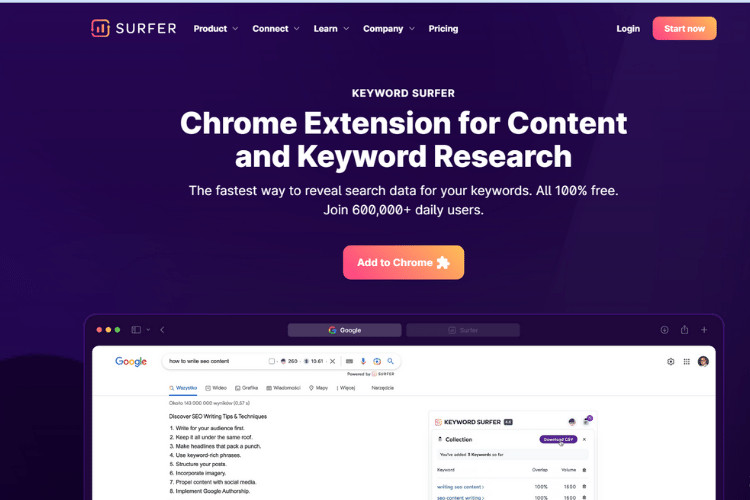
Keyword Surfer is a game-changer in the world of SEO tools. As a free Chrome extension, it’s a go-to choice for SEO enthusiasts and content creators looking to streamline their keyword research process.
What sets it apart is its seamless integration with Google’s search results, offering a wealth of valuable data right at your fingertips.
This nifty extension provides insights into search volume, CPC (Cost per Click), keyword suggestions, related terms, visibility metrics, and on-page data, making it a robust tool for refining your content strategy.
Pros
- Has a user-friendly interface, making it a hit with beginners and SEO professionals alike.
- Helps quickly assess how often a keyword is searched for and prioritise relevant and high-traffic keywords.
- Suggests related keywords, expanding your content strategy's reach.
- Features local keyword optimisation, making it ideal for businesses targeting specific regions.
Cons
- Absence of a keyword difficulty score makes it challenging to gauge the competitiveness of keywords.
- The AI writer add-on has been noted as relatively costly compared to competitors.
- Primarily focuses on the local keywords of a few countries, potentially limiting its use for global SEO.
2. Google Keyword Planner
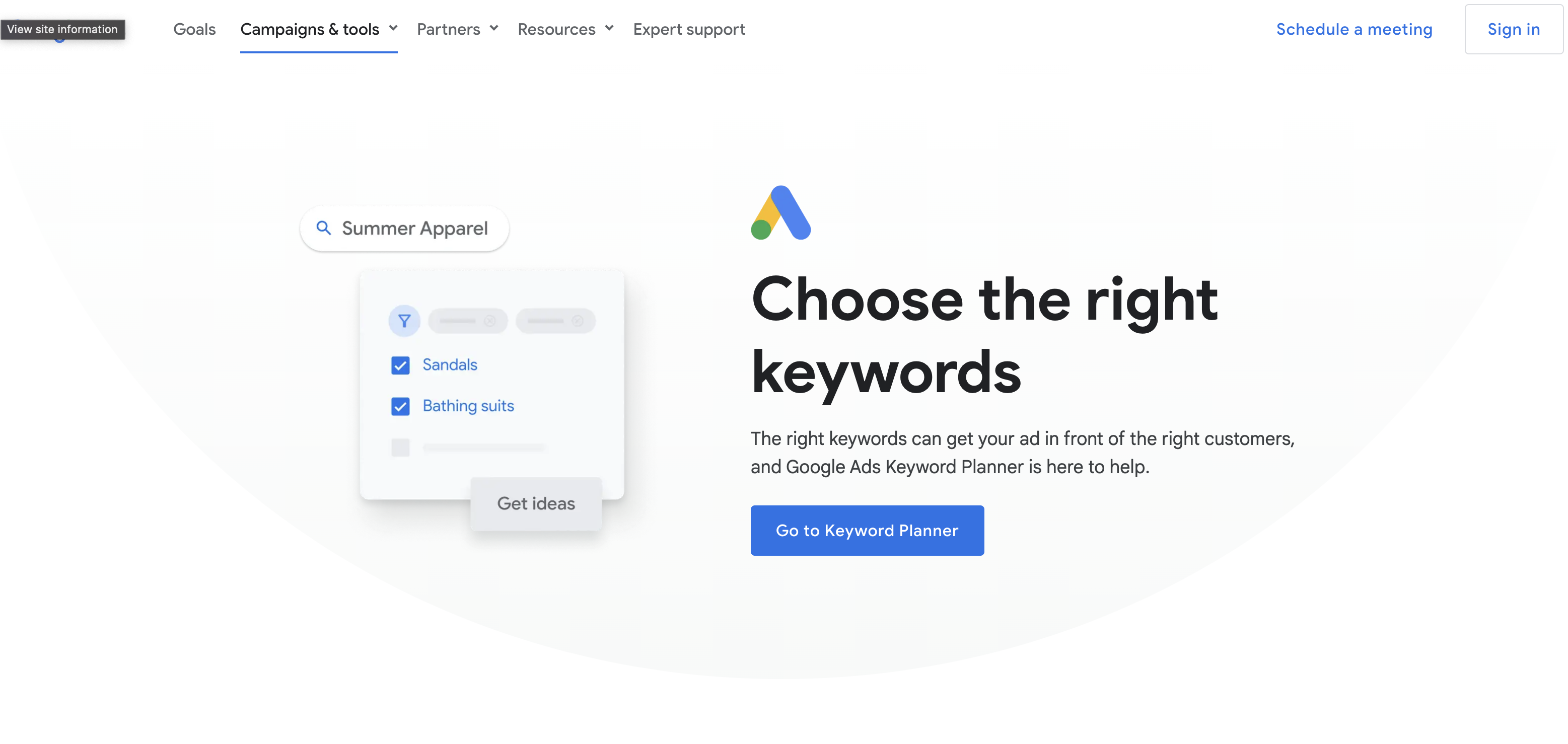
Google Keyword Planner is a powerhouse tool indispensable for advertisers and website owners looking to optimise their online presence through strategic keywords.
As a free offering by Google, it’s accessible through Google Ads. While you’ll need a Google Ads account, rest assured that accessing the Keyword Planner won’t cost you a dime.
With Google Keyword Planner, you can dive deep into keyword research, unearthing those golden nuggets of keywords that resonate with your audience.
It lays out insights on keyword search volumes, competition levels, and suggested bid amounts, empowering you to choose which keywords to target.
One noteworthy feature is its ability to curate the most relevant keyword ideas based on your seed keyword, streamlining the keyword selection process for Google Ads campaigns and content optimisation.
Pros
- Provides an extensive list of keyword suggestions.
- Gauge keyword popularity with estimated monthly search volumes.
- Track keyword trends over time to help identify seasonal trends and plan marketing campaigns accordingly.
- Swiftly export keyword data for versatile use in your digital marketing strategy.
Cons
- Detailed search volume data for all keywords is no longer available.
- Focuses mainly on Google search data, potentially missing insights from other search engines or platforms.
- Doesn't offer data on keyword difficulty or search intent, essential for understanding competition and aligning content with user needs.
3. Ubersuggest
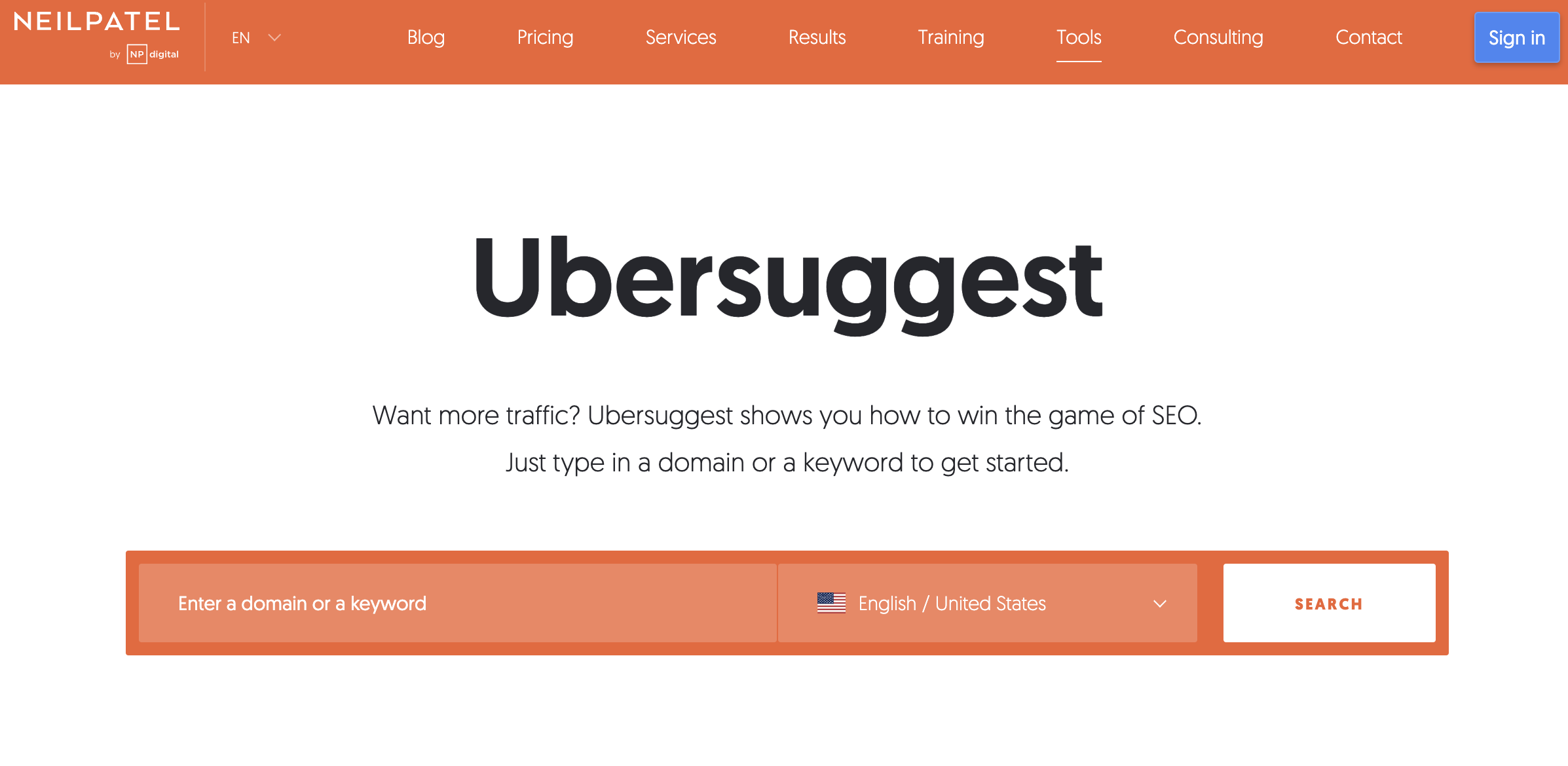
Ubersuggest is a versatile SEO tool catering to the needs of marketers, website owners, and SEO professionals. This dynamic tool has many features, including keyword research, competitor analysis, site audits, etc.
Ubersuggest doesn’t stop at keywords; it empowers you to perform SEO audits to pinpoint and resolve website errors, thus elevating your search engine rankings. Its competitive analysis capabilities help you decipher your rivals’ strategies and uncover avenues to outperform them.
What’s more, Ubersuggest’s knack for generating content ideas and backlink opportunities sets it apart, making it a go-to resource for brainstorming blog topics and uncovering sources for invaluable backlinks to bolster your website’s authority.
Join 900+ to receive a weekly SEO video from my YouTube channel, which I’ll share, and an actionable SEO tip every week.
Pros
- Excels in keyword research, providing a wide array of keyword suggestions, including long-tail and related keywords.
- Delivers robust competitor analysis features, allowing you to peek into your competitors' strategies.
- Caters to users of all levels, making keyword research and website analysis a breeze.
- Helps generate engaging content ideas by revealing trending topics in your niche, ensuring your content resonates with your audience.
Cons
- While the free version offers valuable insights, it falls short of the comprehensive data provided by the paid version.
- May struggle to deliver highly targeted data for specialised industries or niche topics.
- Lack of a dedicated mobile app might inconvenience users who prefer mobile applications for on-the-go SEO research.
4. LowFruits
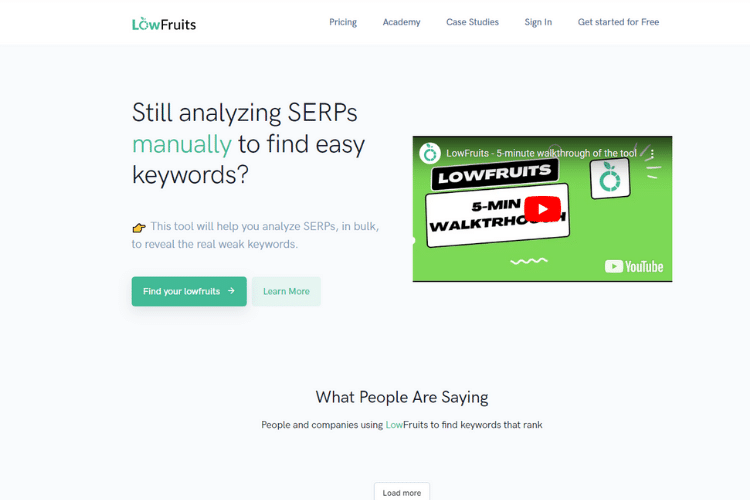
LowFruits is a potent SEO tool that streamlines keyword research, helping you boost your organic traffic and supercharge your SEO efforts. It excels in identifying low-competition keywords, making it a gem for marketers and SEO enthusiasts.
The user interface is also intuitive, and one of its standout features is its ability to visually display keyword difficulty. This means you can easily pinpoint keywords with excellent ranking potential—a valuable advantage if you ask me!
Additionally, LowFruits empowers you with keyword clustering, allowing you to target related keywords concurrently, thereby enhancing your SEO game plan.
Pros
- Generates a wide range of keyword suggestions, leveraging Google autocomplete. Can be invaluable for users looking to explore diverse keyword options quickly.
- Doesn't require sign-ups or subscriptions, and it boasts an incredibly user-friendly interface.
- Excels in identifying long-tail keywords, which are essential for content creators aiming to connect with specific, niche audiences. It's a valuable asset for tailoring content to specialised demographics.
- Empowers marketers to craft content that seamlessly aligns with their target audience's search queries and interests.
Cons
- Relies on Google autocomplete suggestions, which might overlook keyword opportunities from other search engines or platforms.
- Doesn't provide precise search volume data or detailed search intent insights. This limitation can make it challenging to accurately gauge keyword competitiveness and value.
- While it's a valuable resource for keyword ideas, more advanced SEO marketing strategies may require additional software or platforms.
Recommended reading
5. Keyword Sheeter
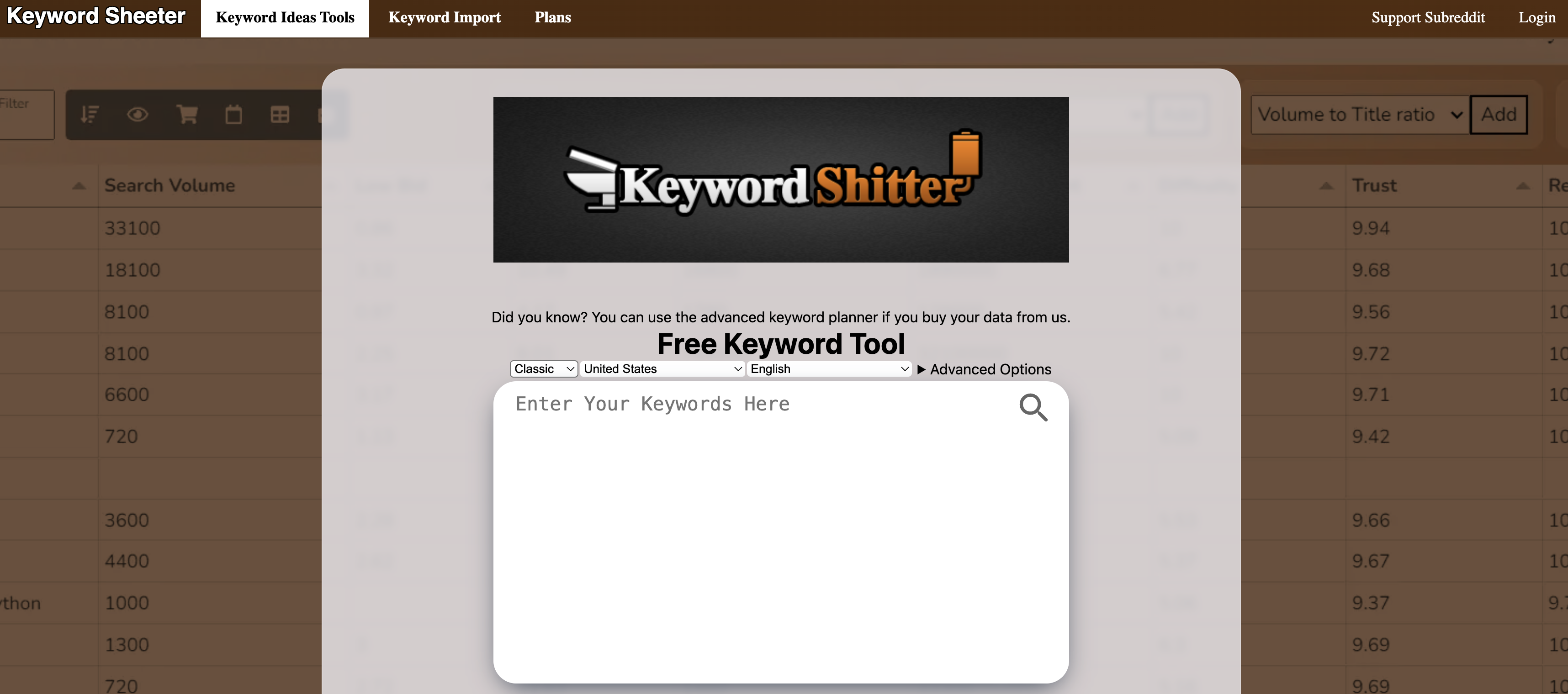
Keyword Sheeter is a dynamic and free keyword research tool designed to empower SEO professionals, content creators, and digital marketers with many keyword suggestions.
It diverges from traditional keyword tools by harnessing the power of Google autocomplete suggestions.
Using Keyword Sheeter is a breeze. Users simply input their desired keywords (one per line) and hit the “Sheet keywords” button.
In an instant, the tool generates a rich list of keyword ideas that are closely tied to the input. This makes it an invaluable resource for discovering long-tail keywords and trending search terms.
Pros
- Rapidly produces an extensive array of keyword ideas by tapping into Google autocomplete suggestions.
- Requires no sign-ups or subscriptions, and boasts a user-friendly interface, making it accessible to users of all levels of technical expertise.
- Excels in long-tail keyword discovery, aiding content creators in connecting with specialised demographics.
- Empowers marketers to craft content that aligns seamlessly with their target audience's search queries and interests.
Cons
- Primarily relies on Google autocomplete suggestions, potentially overlooking keyword opportunities from other search engines or platforms.
- Lacks precise search volume data, keyword difficulty scores, and detailed search intent insights, making it challenging to gauge keyword competitiveness and value accurately.
- Users seeking advanced features and in-depth keyword analysis may need to complement Keyword Sheeter with other tools.
6. Keyword Magic Tool from Semrush
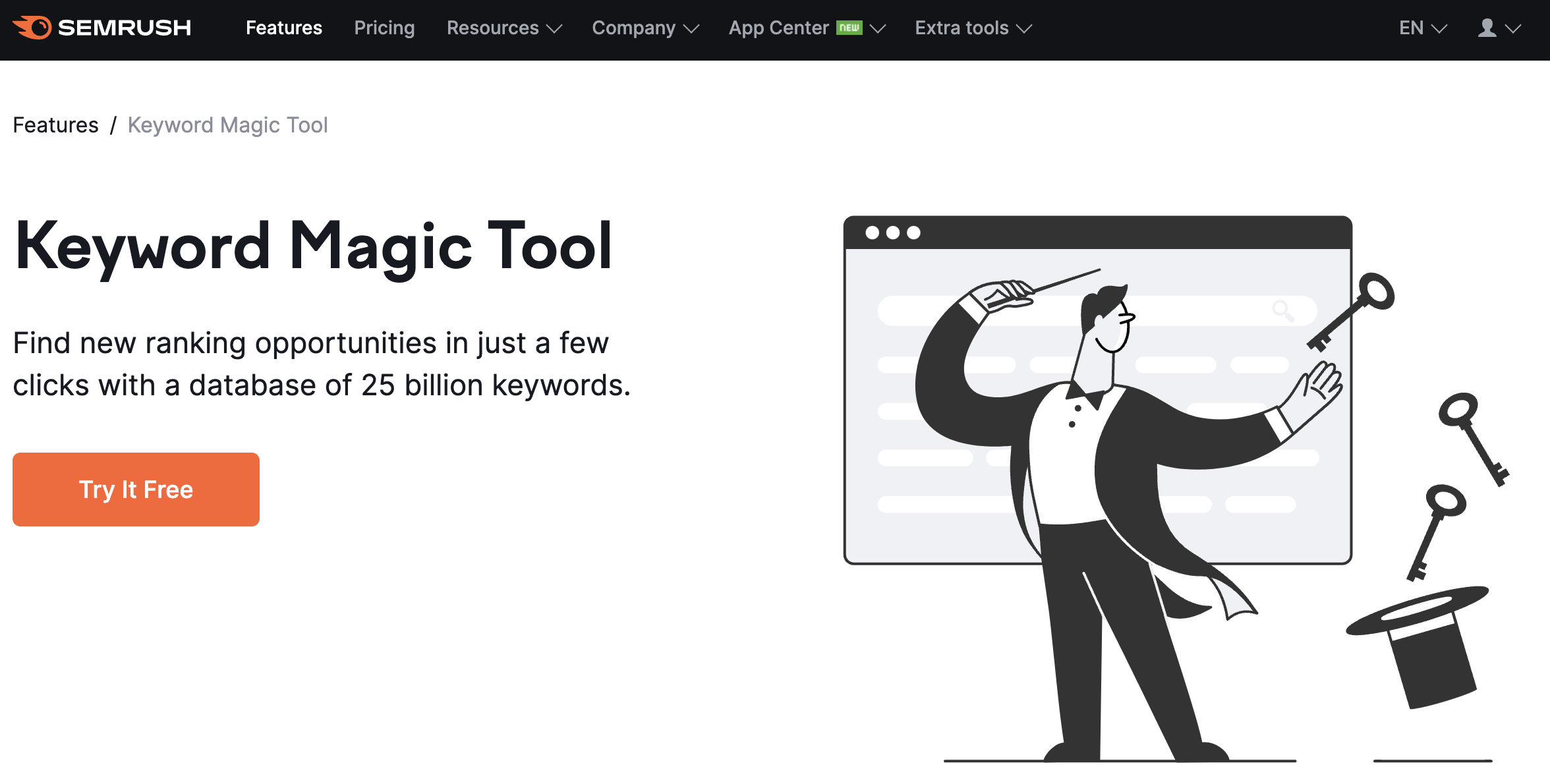
The Semrush Keyword Magic Tool is a potent resource for keyword research, catering specifically to SEO and PPC campaigns.
For starters, it has access to a colossal database, housing over 24.6 billion keywords. This feature helps enable exploration across a broad spectrum of niches and topics.
Additionally, by inputting a seed keyword, you can effortlessly generate a list of pertinent and related keywords. As such, you streamline keyword strategy expansion.
The tool also boasts an intuitive, organised interface that simplifies the keyword research process. It allows for quick organisation and filtering of keyword lists, enhancing research efficiency.
Plus, you can tailor your research to target specific geographic locations, ensuring you pinpoint keywords most relevant to your audience’s location.
Pros
- Empowers users to explore a wide range of keywords, including short-tail and long-tail variations.
- Streamlines keyword generation by inputting a seed keyword and automatically providing a comprehensive list of related keywords.
- Keywords are automatically grouped into subcategories based on topics, simplifying keyword research organisation and content creation.
- Offers valuable insights into search intent, aiding users in aligning their content and ad campaigns with user expectations.
Cons
- Full access to the Keyword Magic Tool's capabilities requires a paid subscription. The free option comes with limitations on daily keyword searches.
- In the competitive world of SEO and online marketing, standing out requires effort, despite the insights provided by the tool.
- The tool only permits a single user to be logged in at a time with one Semrush login, potentially hindering team collaboration.
Wrap-Up: What Is the Best Keywords Everywhere Alternative?
To sum up. finding the best Keywords Everywhere alternative depends on your specific needs.
Keyword Surfer offers free, location-specific data, while Google Keyword Planner provides historical insights.
Ubersuggest excels in affordability and keyword research, LowFruits uses Google Autosuggest, and Keyword Sheeter simplifies the process.
Semrush’s Keyword Magic Tool is a top choice for extensive data and efficiency.
Consider your budget, goals, and expertise to select the perfect keyword companion for your SEO and content endeavours in 2024.



